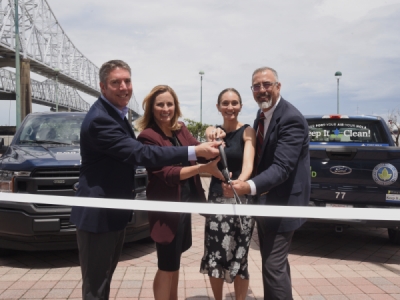
Posted on June 20, 2019
With existing electric vehicle charging infrastructure in place and working toward energy efficiency investments defined in their new Strategic Master Plan, the Port of New Orleans (Port NOLA) expanded its EV fleet with the help of the Clean Fuel Transition Fund for Public Fleets, managed by the Regional Planning Commission’s Clean Fuel Partnership program.
This funding helped the Port offset the costs of two plug-in hybrid electric F-150s equipped with extended range technology, including a high voltage lithium battery pack and regenerative braking.
The systems, developed by XL, enable an estimated 50% increase in miles per gallon and 33% decrease in emissions. Project partners celebrated this innovative clean transportation project at a ribbon cutting ceremony held Tuesday, June 18, at Port NOLA.
“We are pleased to celebrate Port NOLA’s new plug-in hybrid electric trucks, which are helping the Port save fuel, reduce emissions and invest in efficiency,” said Port NOLA President and CEO Brandy D. Christian. “We would like to thank the Regional Planning Commission and the Clean Fuel Partnership, as well as XL. We look forward to continuing to implement projects that help drive energy-efficiency and sustainability.”
The Regional Planning Commission established the Clean Fuel Partnership to promote and facilitate the implementation of fuel saving and emissions reduction projects in the transportation sector.
The Louisiana Department of Transportation and Development awarded RPC funding through the U.S. Department of Transportation, Federal Highway Administration’s Congestion Mitigation and Air Quality Improvement Program to support projects that reduce air emissions and improve environmental quality.
RPC elected to use this funding, via executing the Clean Fuel Transition Fund for Public Fleets to support public fleets with incorporating clean fuel alternatives into their operations to reduce air quality impacts associated with transportation fleets.
Eligible fleets could receive 80% of the incremental cost difference between a new alternative fuel vehicle and the gasoline powered version; 80% of the cost to convert an existing vehicle to alternative fuel; and 80% of the cost to purchase and install anti-idling equipment.
To learn more about clean transportation projects in Greater New Orleans, visit the Clean Fuel Partnership’s website: www.cleanfuelpartnership.org.
To learn more about Port of New Orleans’ sustainability initiatives, visit: www.portnola.com/community/sustainable-development.
Source: uptownmessenger.com





